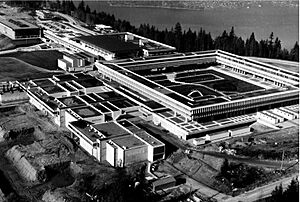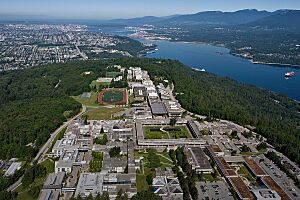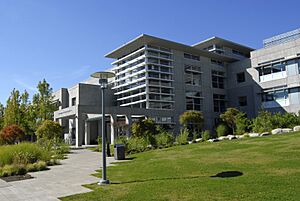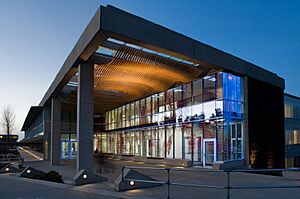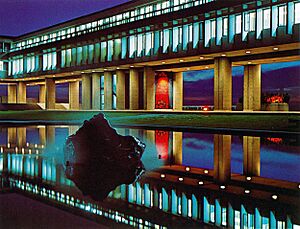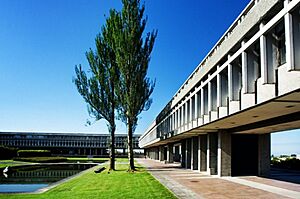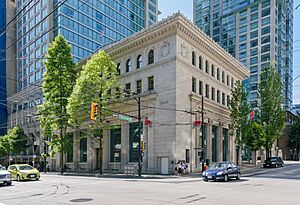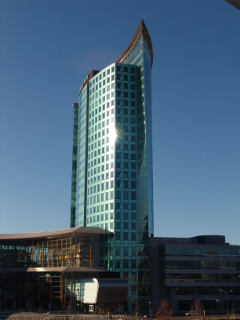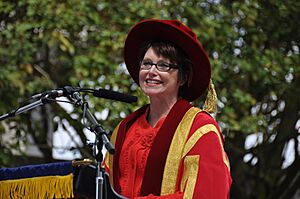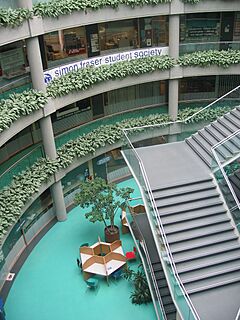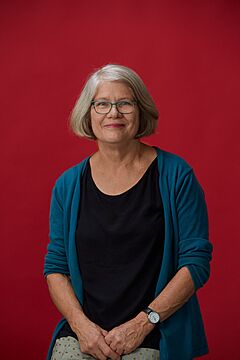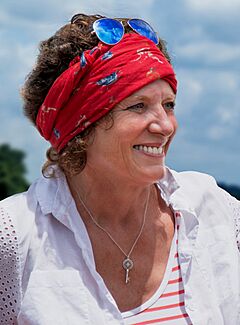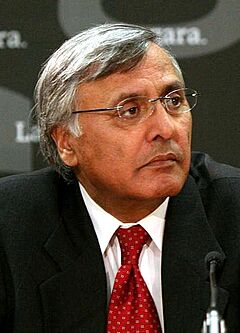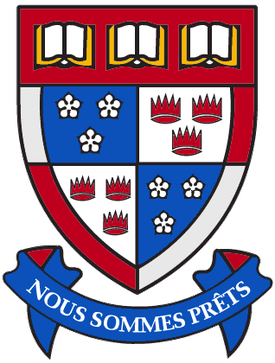Simon Fraser University facts for kids

Coat of arms of SFU
|
|
| Motto | Nous sommes prêts (French) |
|---|---|
|
Motto in English
|
"We are ready" |
| Type | Public |
| Established | 1965 |
|
Academic affiliations
|
ACU, CARL, CUSID, Universities Canada |
| Endowment | CA$605 million (2021) |
| Budget | CA$653 million (2022) |
| Chancellor | Tamara Vrooman |
| President | Joy Johnson |
| Vice-Chancellor | Joy Johnson |
|
Academic staff
|
1,095 |
| Students | 30,380 (Fall 2022) |
| Undergraduates | 25,690 (Fall 2022) |
| Postgraduates | 4,690 (Fall 2022) |
| Location |
Greater Vancouver, British Columbia, Canada
|
| Campus | 3 (Burnaby, Surrey, Vancouver) |
| Language | English |
| Tagline | Canada's Engaged University |
| Colours | Light red, dark red |
| Nickname | Red Leafs |
|
Sporting affiliations
|
NCAA Division II – GNAC |
| Mascot | Red Leafs |
 |
|
Simon Fraser University (SFU) is a large public university in British Columbia, Canada. It's known for its research and has three campuses in the Greater Vancouver area. The main campus is in Burnaby, with others in Surrey and Vancouver.
The main Burnaby campus is located on Burnaby Mountain. It opened in 1965 and is quite large, covering about 170 hectares (420 acres). More than 30,000 students attend SFU, and over 160,000 people have graduated from the university. SFU was created to help more people in Canada get a higher education.
SFU is part of many important groups for universities, both in Canada and around the world. It also works with other universities and groups on special research projects. For example, it helps run TRIUMF, Canada's national lab for studying tiny particles. This lab has the world's largest cyclotron, a machine used to speed up particles. SFU also works with Bamfield Marine Station, a big center for learning about ocean life.
Students at SFU can take classes all year long, with three semesters. SFU has won many awards for its buildings and for its research. Many SFU teachers and graduates have won important awards, like fellowships to the Royal Society of Canada. Famous people who went to SFU include three former leaders of British Columbia, the owner of the Vancouver Canucks hockey team, and Terry Fox, a humanitarian and cancer research activist.
Contents
Discovering Simon Fraser University's Past
Simon Fraser University started because of a report in 1962 that suggested a new university was needed in the Lower Mainland area of British Columbia. On March 1, 1963, the government officially agreed to create the university in Burnaby. The university was named after Simon Fraser, a famous fur trader and explorer.
In May 1963, Gordon M. Shrum became the university's first leader. He suggested that the top of Burnaby Mountain, which is 365 meters (1,198 feet) high, would be the best spot for the new school. Architects Arthur Erickson and Geoffrey Massey designed the university, and building started in the spring of 1964. The campus looks out over the Burrard Inlet. Just 18 months later, on September 9, 1965, SFU welcomed its first 2,500 students.
In its early years, SFU was known for student activism. This led to some changes in how departments were organized. During this time, Thelma Finlayson became the first female teacher in the Department of Biological Sciences. She later became the first female professor emerita when she retired.
SFU in the 21st Century
In 2007, SFU started offering special "dual and double degree" programs. This means students can earn two degrees by studying at SFU and an international university, like Zhejiang University in China or Monash University in Australia.
In 2009, SFU made history by becoming the first Canadian university to join the National Collegiate Athletic Association (NCAA). This is a major sports organization in the United States. Since 2011, all 19 of SFU's sports teams compete in the NCAA's Division II.
On September 9, 2015, SFU celebrated its 50th birthday. By then, over 130,000 students had graduated from the university.
In early 2022, the city of Burnaby announced it would support a new gondola project for SFU. This gondola will help students and staff get to the Burnaby campus more easily as part of the public transit system.
Exploring SFU's Campuses
Simon Fraser University has three campuses, each in a different part of Greater Vancouver. The first and main campus is in Burnaby, on top of Burnaby Mountain. The Vancouver campus has several buildings in downtown Vancouver. The Surrey campus is located inside a building called Central City.
The Vancouver campus has grown to include several other buildings. In 2010, the SFU Contemporary Arts school moved into a new space called the Goldcorp Centre for the Arts.
All three SFU campuses are easy to reach by public transit. The Vancouver campus is near the Waterfront SkyTrain station. The Surrey campus is right next to the Surrey Central SkyTrain station. The Burnaby campus has shuttle buses that connect it to nearby SkyTrain stations.
The Burnaby Mountain Campus
The main campus is on top of Burnaby Mountain. This land is the traditional territory of several First Nations, including the Tsleil-Waututh, Kwikwetlem, Squamish, and Musqueam Nations. The campus is 365 meters (1,198 feet) high and looks out over the Burrard Inlet. All the main university departments are located here.
The library on the main campus is called the W. A. C. Bennett Library. The campus also has two gym complexes and a large swimming pool. There is a Museum of Archaeology and Ethnology and three art galleries. The campus buildings have won many awards for their unique design.
The Burnaby campus has many buildings connected together. It covers about 170 hectares (420 acres) on Burnaby Mountain. On the western side of the campus is a community called UniverCity. Some of the buildings on campus include:
- West Mall Complex (WMC)
- Lorne Davies Gym Complex
- Chancellor's Gym Complex
- Convocation Mall
- W. A. C. Bennett Library
- Halpern Centre
- Maggie Benston Centre (MBC)
- SFU Theatre
- Gym, Pool, Fitness Centre
- Robert C. Brown Hall (RCB)
- Academic Quadrangle (AQ)
- Shrum Science Centre (SSC)
- SSC Biology (B)
- SSC Biomedical Physiology and Kinesiology (K)
- SSC Chemistry (C)
- SSC Physics (P)
- South Science Building (SSB)
- Applied Sciences Building (ASB)
- Education Building (EB)
- Technology and Science Complex (TASC) I
- Technology and Science Complex (TASC) II
- 4D LABS
- Blusson Hall (BLU)
- Saywell Hall (ASSC)
- Strand Hall
- Trottier Observatory and Science Courtyard
Because of its unique "Brutalist" style of architecture, many buildings on the Burnaby campus have been used as filming locations for movies and TV shows.
Libraries, Museums, and Galleries
Each SFU campus has its own library. The biggest one is the W.A.C. Bennett Library on the Burnaby campus. It holds over 2.7 million books and other materials.
SFU also has a Museum of Archaeology and Ethnology. This museum shows exhibits created by students. It also has collections from archaeological digs and research. The museum has a large collection of Indonesian shadow puppets and objects from different cultures around the world. It also has over 120,000 images related to archaeology and ethnology.
The SFU Library has digital collections that you can access online. These include historical documents about British Columbia and Western Canada. There's also a collection of over 1,200 posters from Vancouver's punk music scene.
SFU has several art galleries: SFU Gallery (Burnaby), Audain Gallery (Vancouver), and Teck Gallery (Vancouver). These galleries manage the Simon Fraser University Art Collection, which has over 5,500 artworks from the last century.
The Bill Reid Centre at SFU focuses on Northwest Coast Indigenous art. It has a collection of 50,000 items, mostly digital images and documents. These show the art, culture, and history of different First Nations cultures from the Northwest Coast.
Student Residences
The Burnaby campus offers housing for 1,766 students in six different areas. All these residences are on the western side of the campus.
- The Towers (opened in 2004) are three dormitory buildings. One of them has a 14-room hotel called "The Simon Hotel."
- McTaggart-Cowan Hall (built in 1985) is a traditional dorm.
- Shell House (built in 1967) is also a traditional dorm.
- The Townhouse Complex (built in 1993) has three-level units for up to four students each.
- Hamilton Hall (built in 1993) is for graduate students.
UniverCity Community
UniverCity is a community located right next to Simon Fraser University on Burnaby Mountain. It has won awards for its eco-friendly planning. The idea for this community started in 1963. Building began in 2000, creating a new living and shopping area next to the campus.
As of 2011, about 3,000 people live in UniverCity. The main shopping area has restaurants, stores, and a large grocery market. A new elementary school, University Highlands Elementary, opened here in 2010. More new homes are still being built in UniverCity.
The Surrey Campus
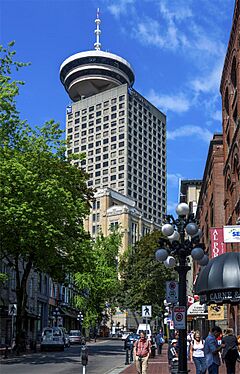
The Surrey campus has two buildings in Whalley / City Centre, Surrey. The main building is part of Central City, a large building complex next to the Surrey Central SkyTrain station. This campus opened in 2002.
The Fraser Library, a branch of the SFU Library, is on the second floor of this campus. It's the only SFU library with a games room, where students can play arcade and console games.
A separate five-floor building for the Surrey campus opened in 2019. This building is designed to be very energy efficient. It mainly houses the Sustainability Energy Engineering (SEE) program and has labs, classrooms, and offices for 440 students.
The Vancouver Campus
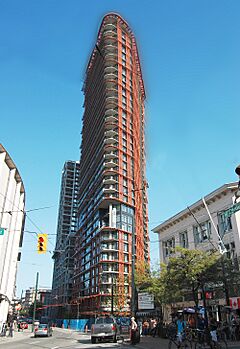
The Vancouver campus started in the 1980s with just one classroom. It was the first university classroom in downtown British Columbia. Much of the money to build this campus came from private donations.
The Vancouver campus now has eight buildings spread across downtown. These include SFU Harbour Centre, the Morris J. Wosk Centre for Dialogue, and the Segal Graduate School of Business. The original campus building at Harbour Centre opened in 1989. Today, the Vancouver campus serves over 70,000 people each year, including about 10,000 students. The Belzberg Library is located at the Vancouver campus.
In 2010, SFU Contemporary Arts moved to the historic Woodward's area in downtown Vancouver. This new facility, called the Goldcorp Centre for the Arts, is very large. It has space for more students and new cultural facilities, like a theatre, screening rooms, and art galleries.
How Simon Fraser University is Run
SFU is managed according to the British Columbia University Act.
Convocation
The convocation includes all teachers, senators, and graduates of the university. Its main job is to choose four senators. Graduation ceremonies are held twice a year to give out degrees and other awards.
Board of Governors
The Board of Governors is in charge of managing the university. It includes the chancellor, the president, students, teachers, staff, and eight people chosen by the government.
Senate
The Senate is in charge of the university's academic decisions. It includes the chancellor, the president, vice-presidents, deans of faculties, and student and faculty members. The president leads the Senate.
Chancellor
The chancellor is chosen by the Board of Governors for a three-year term. Their main jobs are to give out degrees at graduation ceremonies and represent the university at formal events.
President and Vice-Chancellor
The president and vice-chancellor is the chief executive officer of the university. They are in charge of the daily running of the university and also lead the Senate. The current president is Joy Johnson, who started her term in 2020.
What You Can Study at SFU
Simon Fraser University has eight main faculties, which are like different schools or departments:
- Faculty of Applied Science
- Faculty of Arts and Social Sciences
- Beedie School of Business
- Faculty of Communication, Art and Technology
- Faculty of Education
- Faculty of Environment
- Faculty of Health Sciences
- Faculty of Science
Undergraduate Programs
In Fall 2021, SFU had over 25,500 undergraduate students. About 21% of these students came from other countries, mostly from Asia. The Simon Fraser Student Society (SFSS) is the student union for undergraduates.
Graduate Programs
In Fall 2021, the university had over 4,700 graduate students. About 32% of these students were international. There is a Graduate Student Society that supports graduate students.
Continuing Education
SFU also offers programs and courses for adults who want to keep learning. These programs are often online or part-time. They help working adults earn a bachelor's degree.
Staff Unions
Many staff members at SFU, including teaching assistants and sessional instructors, are part of unions. These unions help protect the rights and interests of the staff.
SFU's Reputation and Rankings
SFU is recognized as a top university in many international rankings.
- In 2022, it ranked among the top 301–400 universities worldwide and 13–17 in Canada by the Academic Ranking of World Universities.
- The 2024 QS World University Rankings placed SFU 318th in the world and 13th in Canada.
- The 2023 Times Higher Education World University Rankings ranked SFU 251–300 globally and 11–13 in Canada.
- U.S. News & World Report ranked SFU 317th in the world and 12th in Canada in its 2022–23 global university rankings.
- In Maclean's 2023 rankings, SFU was ranked first in the "comprehensive university" category in Canada. It also ranked ninth for its overall reputation.
SFU also ranked 18th in the world and 1st in Canada in the World’s Universities for Real Impact (WURI) 2022 rankings.
Research at SFU
In 2020, Simon Fraser University received over C$167 million for research from outside sources. This was the 17th highest amount in Canada.
SFU's research is highly respected. In 2019, the Performance Ranking of Scientific Papers for World Universities ranked SFU 378th in the world for its research impact.
SFU works with other universities and groups on joint research facilities. These include Bamfield Marine Station, which studies marine biology, and TRIUMF, a lab for subatomic physics. SFU also partners with Fraser International College, which helps international students prepare for university.
In 2008, SFU had the highest impact from its publications among Canadian comprehensive universities. It also had high success rates in getting funding for research in natural sciences and social sciences.
In 2022, SFU announced a new research center called the Institute of Neuroscience and Neurotechnology (INN). This center will help with neuroscience research and teamwork across the university.
Student Life at SFU
The student newspaper, The Peak, started soon after the university opened. CJSF 90.1 FM is SFU's campus radio station. The Simon Fraser Student Society helps fund over 300 student clubs. There are many campus events, like the annual Terry Fox Run and multicultural celebrations.
Greek Organizations
SFU has several Greek organizations, like fraternities and sororities. These include:
- Phi Kappa Pi National Fraternity
- Delta Kappa Epsilon International Fraternity
- Kappa Beta Gamma International Sorority
- Delta Alpha Theta National Sorority
- Alpha Pi Phi International Sorority
- Tau Sigma Phi National Sorority
- Phi Delta Epsilon International Pre-Medical Fraternity (Co-ed)
- Alpha Kappa Psi, The Professional Business Fraternity (Co-ed)
SFU Athletics: The Red Leafs
The university's sports teams are called the Simon Fraser Red Leafs. Their mascot is a Scottish Terrier dog named McFogg. There is often a friendly rivalry between SFU and The University of British Columbia in sports.
SFU is the first and only university outside the United States to compete in the National Collegiate Athletic Association (NCAA). Before joining the NCAA, SFU teams competed in Canadian and other North American sports leagues. SFU has 15 varsity sports teams and 300 athletes. All teams compete for NCAA national championships, except for the Women's Wrestling team.
Besides varsity teams, SFU also has many club teams. These include Men's Lacrosse, Men's Hockey, rugby, cheerleading, and rowing.
SFU has won many awards in sports. In 2009, the NCAA accepted SFU as a Division II member. SFU later joined the Great Northwest Athletic Conference. In 2012, SFU became the first international full member of the NCAA.
Many former SFU athletes have gone on to represent Canada in the Olympic Games. These include gold medalists Carol Huynh and Daniel Igali.
Notable People from Simon Fraser University
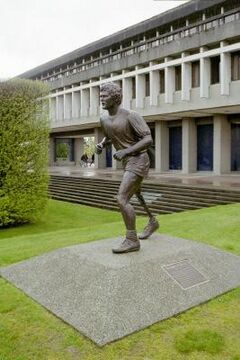
As of 2023, SFU has over 180,000 graduates from more than 140 countries. Many alumni have received important academic awards.
One very famous alumnus is Terry Fox. He was an athlete who went to SFU. He became famous for his "Marathon of Hope," where he ran across Canada to raise money and awareness for cancer research. The Terry Fox Run is now held around the world to honor his efforts. In 2001, SFU gave an honorary degree to Betty Fox, Terry Fox's mother.
Other notable alumni from SFU include:
- Francesco Aquilini, owner of the Vancouver Canucks
- Mahamudu Bawumia, Vice President of Ghana
- Gordon Campbell, former leader of British Columbia
- Jim Chu, former chief of the Vancouver Police Department
- Glen Clark, former leader of British Columbia
- Ujjal Dosanjh, former leader of British Columbia
- Terry Fox, humanitarian and cancer research activist
- Carol Huynh, Olympic gold medalist
- Daniel Igali, Olympic gold medalist
- Pakalitha Mosisili, former Prime Minister of Lesotho
- Mark Okerstrom, former President/CEO of Expedia Group
- Kelly Sheridan, voice actress for Barbie films
- Margaret Trudeau, author and social advocate, former wife of Prime Minister Pierre Trudeau
- Robert Turner, scientist at the Max Planck Institute
- David Usher, singer and songwriter
- Choi Woo-shik, South Korean actor
Honorary Alumni
SFU gives honorary degrees to people from around the world who have achieved great things. In 1967, Marshall McLuhan, a famous media theorist, received the first honorary degree from SFU.
On April 20, 2004, SFU gave honorary degrees to three Nobel Peace Prize winners: the 14th Dalai Lama, Bishop Desmond Tutu, and human rights activist Shirin Ebadi. Other famous people who have received honorary degrees include filmmaker Costa-Gavras, skier Nancy Greene Raine, economist Jeffrey Sachs, primatologist Jane Goodall, and Bill Nye the Science Guy.
SFU's Coat of Arms
The university's original coat of arms was used from its beginning until 2006. At that time, the university decided to make a new version. The new design replaced two crosses with books. Some people at the university felt the crosses made international students think SFU was a religious school, when it is a public, non-religious one. In 2007, the university decided to use both the old and the new coat of arms. A new marketing logo was also introduced in 2007, with white letters on a red background.
See also
 In Spanish: Universidad Simon Fraser para niños
In Spanish: Universidad Simon Fraser para niños
- CJSF-FM
- Education in Canada
- Higher education in British Columbia
- List of colleges and universities named after people
- List of universities in British Columbia
- Simon Fraser Student Society
- The Faculty of Communication, Art and Technology at Simon Fraser University
- The Peak
- Woodward's building
- List of universities in Canada
 | Sharif Bey |
 | Hale Woodruff |
 | Richmond Barthé |
 | Purvis Young |


